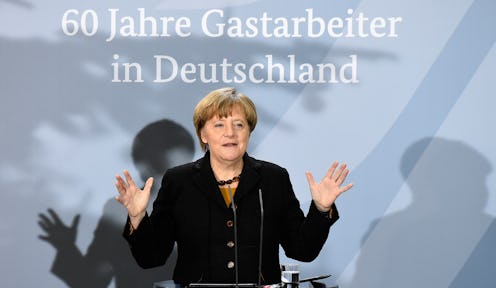News
Angela Merkel Is 'TIME's Person Of The Year
The Today Show revealed Wednesday that German Chancellor Angela Merkel is TIME's Person of the Year, according to a tweet from the show. TIME's magazine editors chose the winner from a shortlist that TIME revealed Monday. Merkel beat out Black Lives Matter activists and Republican presidential candidate Donald Trump, among others.
TIME's piece on Merkel's life and leadership is titled "Chancellor of the Free World," because, in the last year, Merkel has stepped up and allowed almost a million refugees and migrants into Germany's borders without xenophobia. As a leader in the European Union, she navigated Greece away from the European debt crisis, which could have ended in Greece being thrust from the Eurozone and no longer sharing the same currency as 19 other nations — a troubling situation that could have had horrible economic consequences. The magazine said Merkel won the title "for asking more of her country than most politicians would dare, for standing firm against tyranny as well as expedience and for providing steadfast moral leadership in a world where it is in short supply."
On the show, TIME editor Nancy Gibbs said, "This year, she really was tested" and that she "stepped up" to address the problems that needed addressing. It was that leadership that led TIME to choose her as Person of the Year.
Merkel's first "political memory" was the construction of the Berlin Wall in 1961, according to the magazine. At the time, East Germany was seen as a satellite state for the Soviet Union. For the first 35 years of her life, TIME said that Merkel remained a "captive" in the state. TIME speculates that this experience with walls and their effects politically and socially is what led Merkel to be so "generous" and "openhearted" when hundreds of thousands of refugees and migrants began seeking asylum over the past few years. Merkel changed what it meant to be a leader by opening Germany's doors, editor Gibbs wrote in an essay about Merkel's selection as Person of the Year:
By viewing the refugees as victims to be rescued rather than invaders to be repelled, the woman raised behind the Iron Curtain gambled on freedom. The pastor's daughter wielded mercy like a weapon. You can agree with her or not, but she is not taking the easy road. Leaders are tested only when people don't want to follow.
Merkel has stepped up and led with a specific kind of decisiveness, Gibbs wrote. She slowed down Russian President Vladimir Putin's attempt to seize Ukraine, said that Germany would bail out Greece under a set of strict terms, welcomed refugees fleeing persecution under the same terrorist regimes the rest of the world fears, and deployed troops to fight ISIS, according to Gibbs' essay:
Germany has spent the past 70 years testing antidotes to its toxically nationalist, militarist, genocidal past. Merkel brandished a different set of values — humanity, generosity, tolerance — to demonstrate how Germany's great strength could be used to save, rather than destroy. It is rare to see a leader in the process of shedding an old and haunting national identity.
Gibbs pointed out that since Merkel decided to provide asylum to almost a million refugees and migrants, her approval ratings have dropped 20 points and protesters have called her a whore. But she hasn't focused on those criticisms. Rather, she has continued to make difficult decisions and has balanced empathy and leadership in all of her actions. TIME described an instance in July where Merkel spoke with students in a televised discussion called Living Well in Germany. A 14-year-old girl named Reem told Merkel that she and her family were Palestinian refugees who could soon be deported to Lebanon. She said she didn't know what her future would be if she could not stay in Germany with her family, according to TIME: "I want to study. It's really painful to watch how other people can enjoy life and you can't enjoy it with them."
Merkel seemed unsure of what to say at first and started with "I understand," but then she went the honest route, according to TIME:
Sometimes politics is hard. You're a very nice person, but you know that there are thousands and thousands of people in Palestinian refugee camps in Lebanon, and if we say, "You can all come," and, "You can all come from Africa," and "You can all come," we just can't manage that.
In video footage that later went viral, the girl started weeping and Merkel moved across the room, saying "Oh Gott, I want to comfort her."
In addition to BLM activists and Trump, TIME's shortlist for potential winners included ISIS leader Abu Bakr Al-Baghdadi, Caitlyn Jenner, Uber CEO Travis Kalanick, Putin, and Iranian President Hassan Rouhani. Of those choices, there are many leaders or people who are notable for social or economic "firsts." But Merkel is undoubtedly the one who has faced global, unrelenting challenges. Her selection as TIME's Person of the Year makes it clear that leadership is more than outrageous comments or empathetic reassurance — it's being both the good and the bad guy and being aware of exactly what that means.
